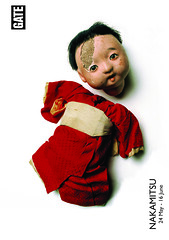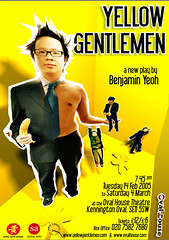Critics: dead white men
Nick Hytner seems to have sparked off a debate about British theatre critics by calling them dead white men.
Of course, this isn’t exactly accurate although hints at some underlying truths. There are more older male critics than younger or female ones.
I’ve found Lyn Gardener’s and Susannah Clapp’s comments more interesting.
Lyn makes the point that she goes to see a wider range of theatre than the first-string theatre critics who mainly sees London-centric main shows. This means that a second strong critic has a wider range of theatre vocabulary and importantly, current theatre vocabulary, to draw from in drawing opinions about plays.
Clapp writes:
“A Matter of Life and Death, which tells its tale not only in dialogue, but with songs and mime and aerialism, is an example of movement theatre, which until now has been mostly seen on the Fringe, where it has regularly disproved the idea that theatre audiences are always over 40. I’ve had some of my best experiences in the theatre watching it. Over at the Telegraph, Charles Spencer has had some of his worst.”
I also believe not only is this newer theatre practise great for British theatre. I think it is flowing through to our young and new (and more established) writers. Both Polly Stenham and Mike Bartlett recently at the Court and a whole host of other writers eg (off the top of my head) Tom Morton-Smith, Duncan Macmillan and the more experienced Dennis Kelly, Chloe Moss, Rebecca Lenkiewicz are developing, have developed exceptional theatrical voices (and I remain forever jealous at that, struggling with my own writing voice….). With the recent change in artistic directors in some of the new writing theatre, I expect to see still more and from some of our “forgotten” but very much living greats like Philip Ridley, whose Leaves of Glass at the Soho has been a welcome commission.
I suppose I am saying, ever onwards and forwards, not backwards. Theatre and art marches on with its history. We can never truly recreate Shakespeare (although we can reinvent it for modern times). Shakespeare was created in reaction to its time and place, and position in cultural history. We can create a theatre of today, whether dead white men appreciate it or not.
comments
2 Responses to “Critics: dead white men”


Ben, thanks for your great Blog mate. Good to hear your remark that Theatre is created in reaction to its time, place and position in cultural history… if only this could always be so! what about the play Behzti, created by a Sikh lady Playwright in response, one presumes, to her “time, place and positiuon in cultural history”. And yet we as a Theatre “Community” have allowed that show, and its violent demise as well as the death threats to the Playwright to fade from our collective memory so quickly…WHY IS THIS?
I don’t think it is forgotten…. but certainly there doesn’t seem to be a collective action.
Partly, I think there is a general difficultly in re-staging new work in general. Once it has been on once, no matter how briefly, it somehow becomes even more difficult to stage it again (just financials?) unless it was an amazing success.
Also, if you look at the difficulties My Name is Rachel Corrie has in the US. Then perhaps one could argue that producing houses in general are perhaps not so brave in staging certain types of work although I am sure one can find exceptions.